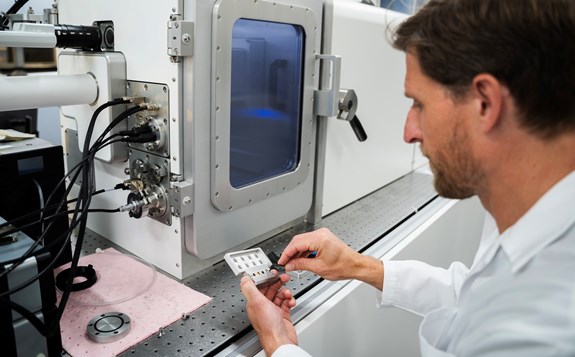We use cookies on this website. Cookies help us deliver the best experience on our website. Read about cookies.
-
- Education
- Education
- Programmes and courses
- Applications and admissions
- Tuition fees
- Scholarships
- Exchange studies at Malmö University
- Study Guidance
-
- After admission
- After admission
- Moving to Malmö
- Pre-orientation
- Arrival guide
-
- About studies at Malmö University
- About studies at Malmö University
- Why choose Malmö University
- Understanding university studies
- Connect with our students
On the page -
- Research
- Research
-
- Doctoral studies
- Doctoral studies
- Doctoral courses
-
- Doctoral schools
- Doctoral schools
- Doctoral school: Education, Learning and Globalisation
- Doctoral school: The National Research School for Professionals in Social Services
- Doctoral school: Learning in Multicultural Societal Contexts
- Doctoral school: ComBine
- Doctoral school: Swedish National Graduate School in Science and Technology Education Research
- Doctoral school: Relevancing Mathematics and Science Education (RelMaS)
- Doctoral school: Sustainable Movement Education
- Doctoral school: Finding ways in a time of great future challenges (FinnFram)
- Doctoral school: Pedagogy and Vocational Skills
- Doctoral school: Culturally Empowering Education through Language and Literature
- Research subjects
-
- Research centres
- Research centres
- Biofilms Research Centre for Biointerfaces
- Citizen Health
- Imagining and Co-Creating Futures
- Institute for Urban Research
- Malmö Institute for Migration Studies
- Literacy and Inclusive Teaching
- Centre for Work Life Studies
- Sustainable Digitalisation Research Centre
- Centre for Sexology and Sexuality Studies
-
- Research publications
- Research publications
- Search publications
- Malmö University Press
- Research events
- Participate in a research study
- Coffee Break Quiz
On the page -
- Collaboration and Innovation
- Collaboration and Innovation
- Innovation
- Collaboration with students
-
- Collaborate with researchers
- Collaborate with researchers
- Labs and facilities
- Culture collaboration
- Support Malmö University
- Alumni & Friends
On the page -
- About us
- About us
-
- Faculties and departments
- Faculties and departments
-
- Faculty of Culture and Society
- Faculty of Culture and Society
- Department of Urban Studies
- Department of Global Political Studies
- School of Arts and Communication
-
- Faculty of Education and Society
- Faculty of Education and Society
- Department of Childhood, Education and Society
- Department of Sports Sciences
- Department of Natural Science, Mathematics and Society
- Department of School Development and Leadership
- Department of Culture, Languages and Media
- Department of Society, Culture and Identity
-
- Faculty of Technology and Society
- Faculty of Technology and Society
- Department of Computer Science and Media Technology
- Department of Materials Science and Applied Mathematics
-
- Faculty of Odontology
- Faculty of Odontology
- Master's programmes in Dental Science
- University Dental Clinic
- Management and decision-making paths
-
- Vision, objectives and strategy 2025
- Vision, objectives and strategy 2025
- Global engagement
- Sustainability
- Widened recruitment and participation
- Quality assurance work at the University
-
- Malmö Academic Choir and Orchestra
- Malmö Academic Choir and Orchestra
- Student work – video pieces
-
- Annual Academic Celebration
- Annual Academic Celebration
- Academic traditions
- Meet our new professors
- The University in a troubled world
On the page
Doctoral school: ComBine
of Biofilms and Biointerfaces
ComBine educates researchers with interdisciplinary knowledge within biofilms and biointerfaces. The PhD projects comprise broad application areas within health, and the strength of the research school is the multidisciplinary environment as well as the broad range of in house equipment and experimental models. ComBine is financed by the Knowledge Foundation.
PhD projects
Find out more about our PhD students and their projects.
Enzymatic activity in oral biofilms – biotechnological applications and putative predictive biomarkers for oral disease
PhD student
Partner
Genovis AB
Supervisors
Rolf Lood, Genovis AB, Claes Wickström, Gunnel Svensäter and Mikael Sonesson, Malmö University
Project description
Oral diseases affect individuals several times during a lifetime, with a prevalence of 3.5 billion people, with worldwide societal costs of $544.4 billion in treatment expenditures and productivity losses due to absence from work/school. In the EU, it is responsible for costs of €90 billion, only ranking behind diabetes and cardiovascular disease. While several studies have advanced our knowledge regarding the microbial composition in the oral flora in health and disease, the underlying role of enzymes and their regulation has mainly been disregarded. Herein, we will investigate the impact of glycosidase expression in oral flora during health/disease. The study is expected to lead to the identification of novel biomarkers for oral health and disease, an area in need of novel, rapid and robust methods for diagnosis and novel biotechnological tools as analytical reagents for biopharmaceuticals.
Investigation of the effect and mechanistic action of a novel antiseptic in the oral environment
PhD student
Partner
CR Competence AB
Supervisors
Roberto Ortis, CR Competence and Julia Davies, Malmö University
Project description
The oral cavity is a highly diverse microbial niche containing around 600 bacterial species. The oral microbiome, which helps to maintain a healthy environment, is found as biofilms on the teeth (dental plaque) and mucosal surfaces. Normally these biofilms are in balance with the host but changes in the oral environment can lead to dysbiosis where biofilms develop virulent properties, leading to diseases such as periodontitis and caries.
To treat disease, recent interest has turned to development of alternatives to antibiotics that can penetrate and selectively kill bacteria. Both acetic and hypochlorous acids have shown promise as effective antiseptics and our goal is to examine their combined action on members of the oral microbiome as well as to understand the mechanisms by which they affect virulence in oral biofilms.
Nanoimprint lithography based bioelectronics
PhD student
Partner
Obducat Technologies AB
Supervisors
Kristian Thulin, Stefan Adolfsson, Obducat Technologies AB, Sergey Shleev and Tautgirdas Ruzgas, Malmö University
Project description
The main goal of the project is to design and test high performance, low cost nanostructured biomodified electrodes which can be reproducibly manufactured with industry-scale throughput. To reproducibly manufacture nanostructured electrodes, nanoimprint lithography will be used. A controlled tuning of the shape, size and order of nano-features, combined with the material chemical properties, can open the way to a large variety of applications such as hybrid bioelectronic devices, including biosensors, biofuel cells and biosupercapacitors. Using inspiration from nature, physical modification of topography can be employed as an effective approach to inhibit and control/monitor bacterial adhesion and biofilm formation on surfaces, reducing the biomaterial-associated infections without promoting the antibiotic resistance. For this purpose bare and nanostructured electrodes with and without biomaterial modifications (proteins and enzymes, organelle and living cells) will be evaluated and characterised in terms of biocompatibility and biofouling.
Nanostructured lipid composites for long-acting parenteral drug delivery
PhD student
Partner
Camurus AB
Supervisors
Justas Barauskas, Camurus AB and Vitaly Kocherbitov, Malmö University
Project description
The focus of this project is to better understand properties of Camurus FluidCrystal® injection depot technology. The FluidCrystal® injection depot consists of a special combination of lipids and an active ingredient that together can form nanostructured liquid crystalline phases in aqueous environments, in this case, under the skin. Formation of liquid crystalline matrix encapsulates the active ingredient that can be released as the matrix degrades in the tissue. Depending on composition, the release can be controlled from several days to weeks and months.
The aim of this project is to strengthen the knowledge of structure-function relation of injectable nanostructured lipid composites. The ultimate goal is the creation of a predictive model describing the relationship between the in vitro properties and in vivo behaviour of the FluidCrystal® injection depot.
Next generation skin care based on algae
PhD student
Partner
Simris Alg AB
Supervisors
Fredrika Gullfot, Simris Alg AB, Sebastian Björklund and Tautgirdas Ruzgas, Malmö University
Project description
The research project is related to advanced skin care based on active compounds extracted from the diatom microalgae Phaeodactylum tricornutum. This particular algal species is a source for lipid-based health supplements containing omega-3 fatty acids. The lipid fraction is obtained from the algae by supercritical carbon dioxide extraction, while the remaining defatted algae biomass (DAB), containing carbohydrates, proteins, and other compounds, remains unused. Our aim is to explore the possibility to use the DAB fraction as a source for advanced skin care products. To approach this challenge, the focus of the industrial PhD project is to characterize the DAB fraction with the aim to identify interesting compounds that may contribute to skin health and skin care, either as active ingredients or as excipient molecules in topical or transdermal drug formulations.
Technologies for tumour-directed Immuno-oncology therapies
PhD student
Partner
Alligator Bioscience AB
Supervisors
Dr Laura von Schantz, Alligator Bioscience AB and Professor Anette Gjörloff Wingren, Malmö University.
Project description
Currently, Immunotherapy, a type of cancer treatment that helps the immune system fight cancer faces several challenges including severe side effects often combined with lack of efficacious response in many patient populations. To improve this, Alligator, the industrial partner in this project, is committed in developing tumour-directed immunotherapies where the focus is on immune activation of the most relevant parts of the immune system to eliminate tumours and induce immunological memory. The PhD project’s main objective is to develop one or several cutting-edge technologies that can be utilized to generate next generation tumour directed antibody compounds. The long-term goal is to boost the development of more effective and safer treatments that can make a true difference for cancer patients.

